Personal and Professional Growth Through Self-Managed Learning
VerifiedAdded on 2024/05/14
|27
|4477
|282
Report
AI Summary
This report evaluates approaches to self-managed learning in relation to personal and professional life, proposing ways to encourage lifelong learning in the workplace to support future goals. It assesses the benefits of self-managed learning for both the individual and the organization. The report further evaluates current skills and competencies against professional standards and organizational objectives, identifying personal development needs and activities to meet them. A personal and professional development plan is devised based on these identified needs, focusing on areas such as decision-making, interpersonal, and analytical skills. The action plan includes strategies like learning from seniors, improving communication, and actively reading relevant materials to enhance skills and seize development opportunities within the Air Hotel setting.
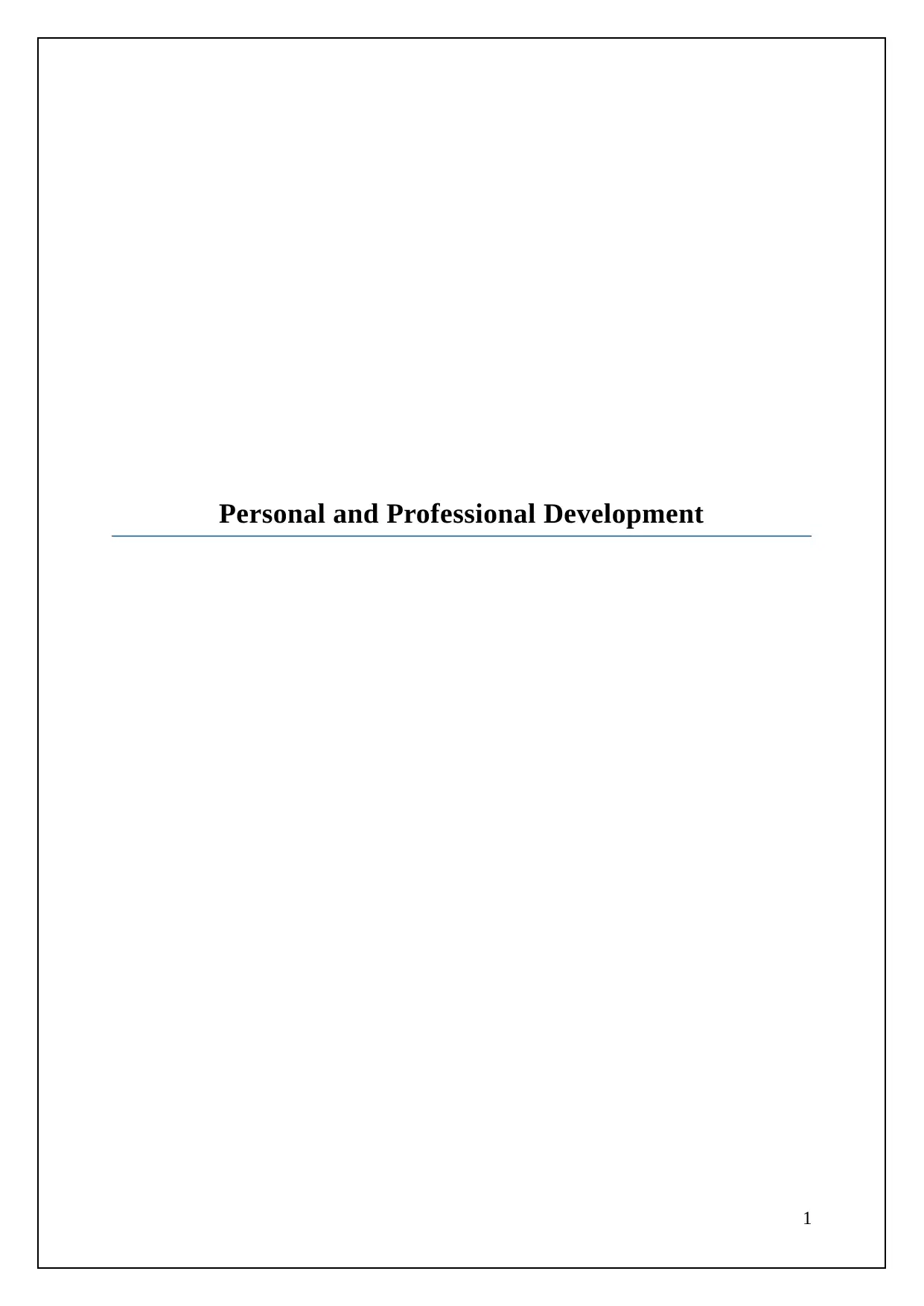
Personal and Professional Development
1
1
Paraphrase This Document
Need a fresh take? Get an instant paraphrase of this document with our AI Paraphraser
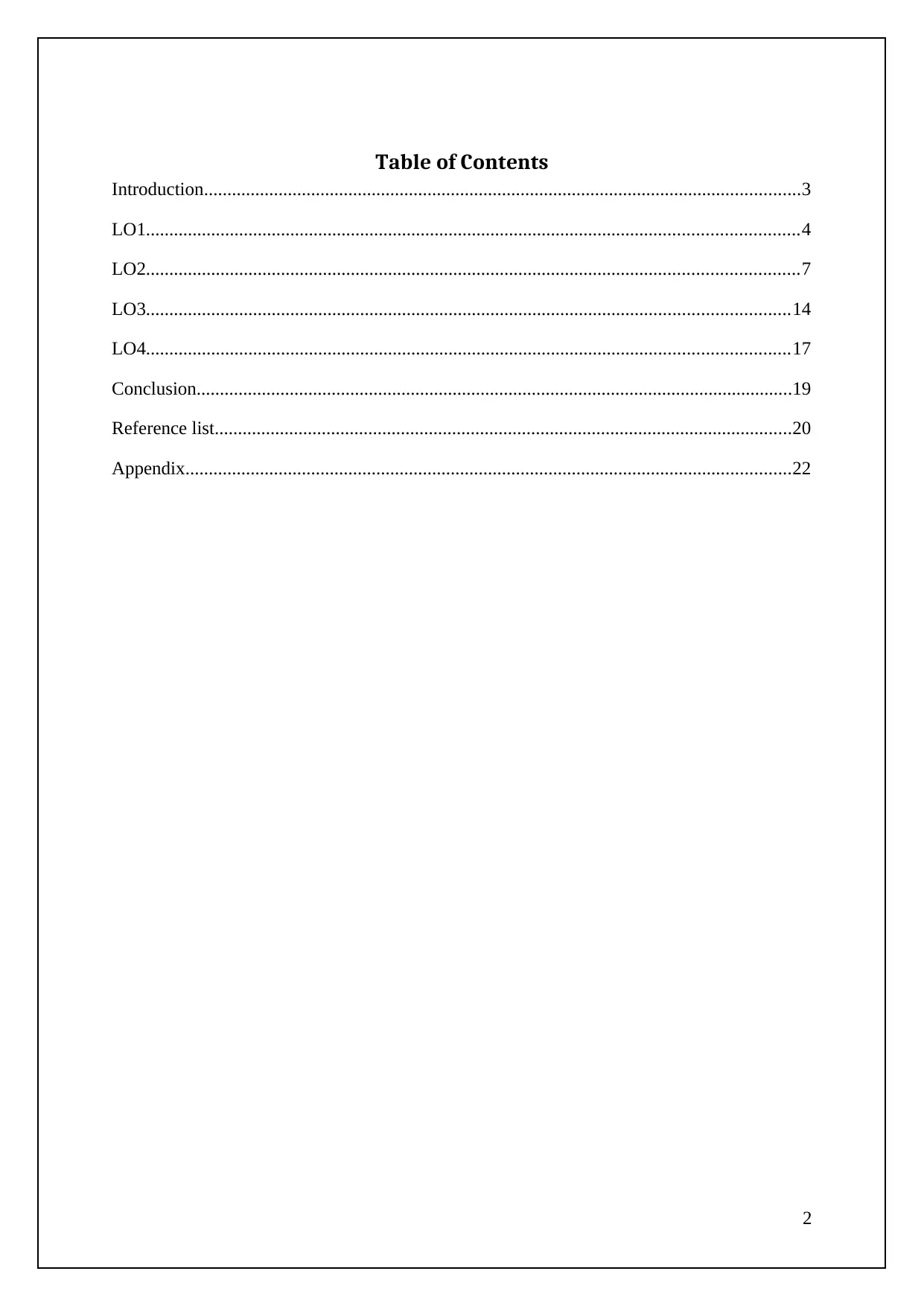
Table of Contents
Introduction................................................................................................................................3
LO1............................................................................................................................................4
LO2............................................................................................................................................7
LO3..........................................................................................................................................14
LO4..........................................................................................................................................17
Conclusion................................................................................................................................19
Reference list............................................................................................................................20
Appendix..................................................................................................................................22
2
Introduction................................................................................................................................3
LO1............................................................................................................................................4
LO2............................................................................................................................................7
LO3..........................................................................................................................................14
LO4..........................................................................................................................................17
Conclusion................................................................................................................................19
Reference list............................................................................................................................20
Appendix..................................................................................................................................22
2
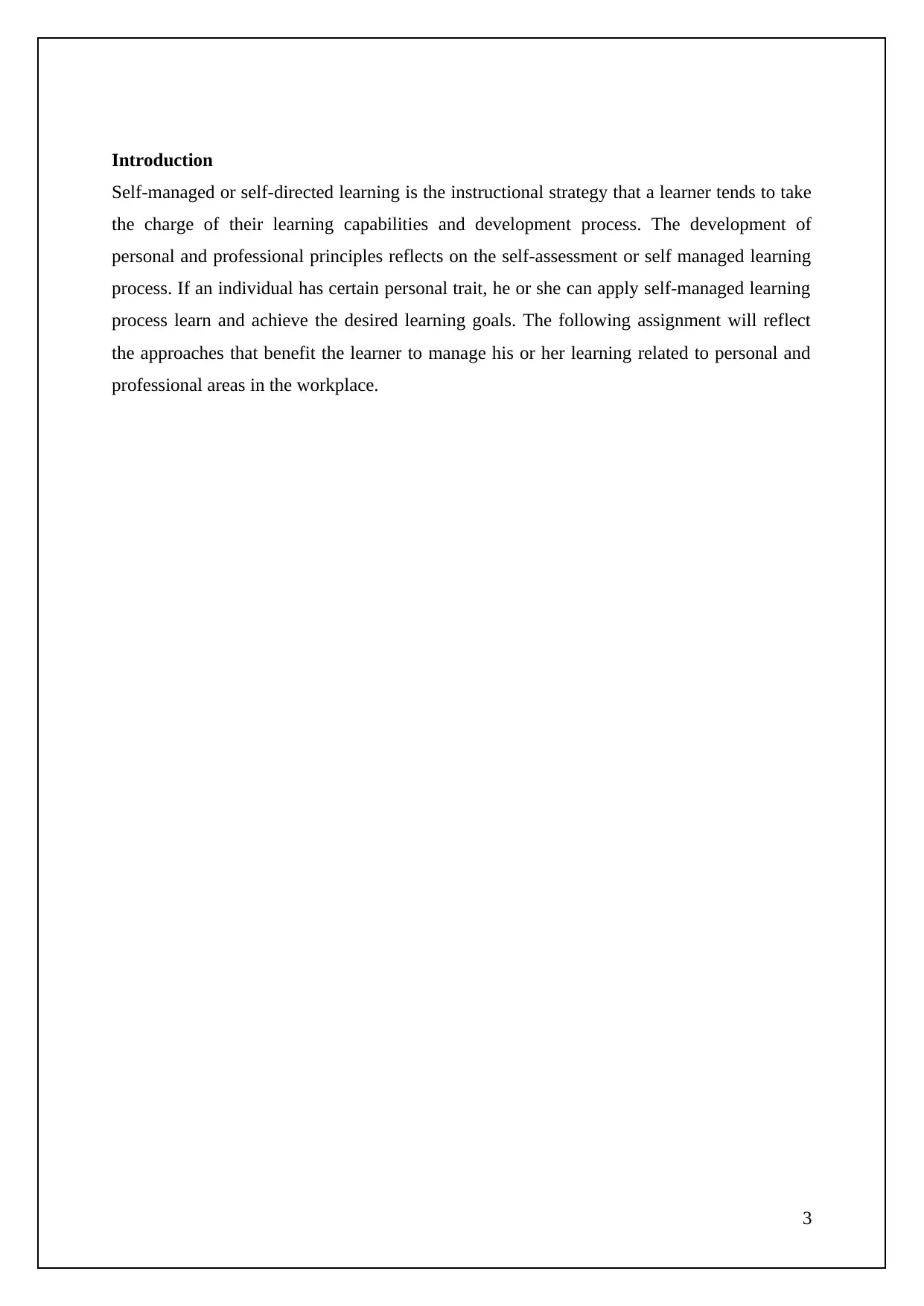
Introduction
Self-managed or self-directed learning is the instructional strategy that a learner tends to take
the charge of their learning capabilities and development process. The development of
personal and professional principles reflects on the self-assessment or self managed learning
process. If an individual has certain personal trait, he or she can apply self-managed learning
process learn and achieve the desired learning goals. The following assignment will reflect
the approaches that benefit the learner to manage his or her learning related to personal and
professional areas in the workplace.
3
Self-managed or self-directed learning is the instructional strategy that a learner tends to take
the charge of their learning capabilities and development process. The development of
personal and professional principles reflects on the self-assessment or self managed learning
process. If an individual has certain personal trait, he or she can apply self-managed learning
process learn and achieve the desired learning goals. The following assignment will reflect
the approaches that benefit the learner to manage his or her learning related to personal and
professional areas in the workplace.
3
⊘ This is a preview!⊘
Do you want full access?
Subscribe today to unlock all pages.

Trusted by 1+ million students worldwide
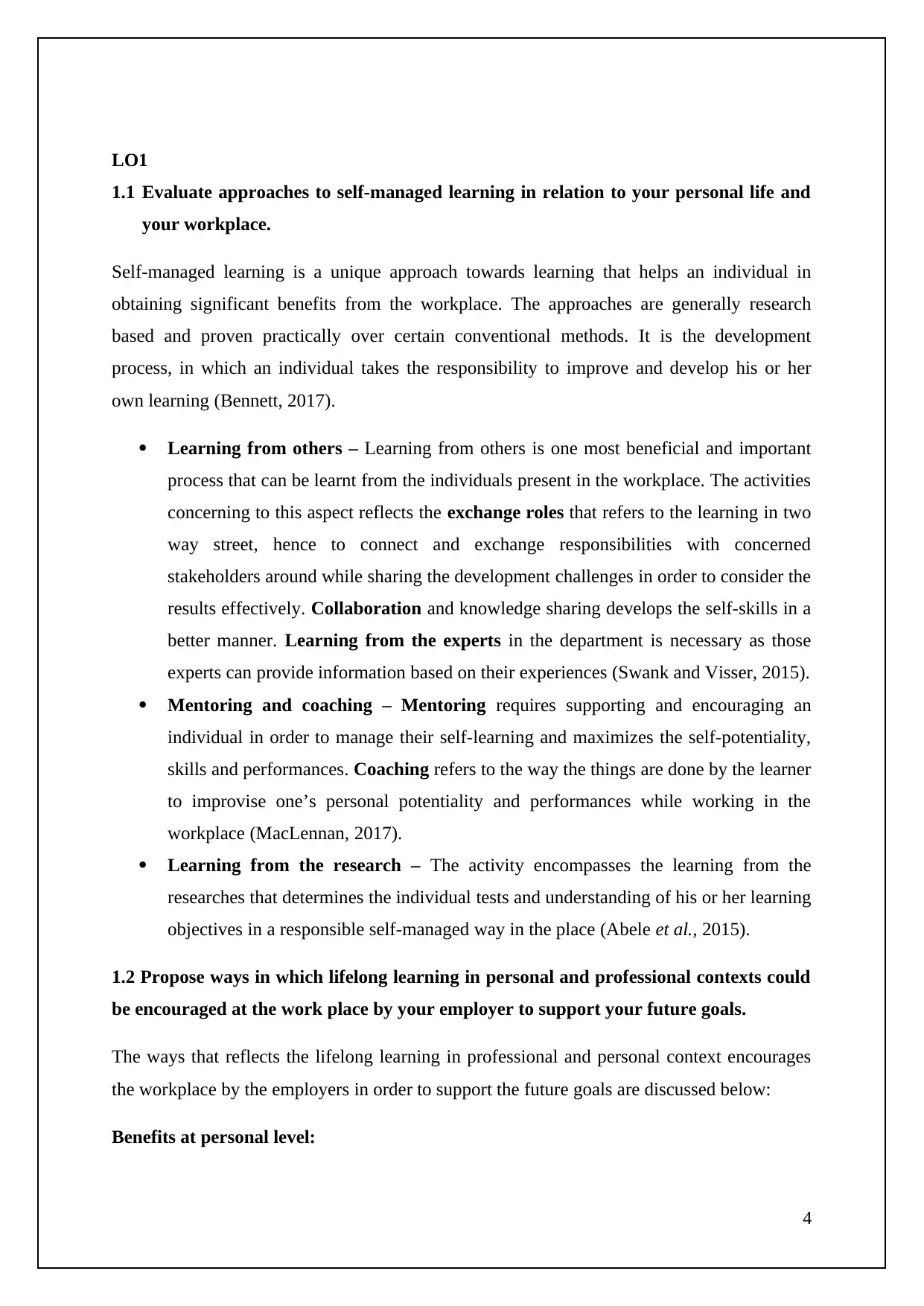
LO1
1.1 Evaluate approaches to self-managed learning in relation to your personal life and
your workplace.
Self-managed learning is a unique approach towards learning that helps an individual in
obtaining significant benefits from the workplace. The approaches are generally research
based and proven practically over certain conventional methods. It is the development
process, in which an individual takes the responsibility to improve and develop his or her
own learning (Bennett, 2017).
Learning from others – Learning from others is one most beneficial and important
process that can be learnt from the individuals present in the workplace. The activities
concerning to this aspect reflects the exchange roles that refers to the learning in two
way street, hence to connect and exchange responsibilities with concerned
stakeholders around while sharing the development challenges in order to consider the
results effectively. Collaboration and knowledge sharing develops the self-skills in a
better manner. Learning from the experts in the department is necessary as those
experts can provide information based on their experiences (Swank and Visser, 2015).
Mentoring and coaching – Mentoring requires supporting and encouraging an
individual in order to manage their self-learning and maximizes the self-potentiality,
skills and performances. Coaching refers to the way the things are done by the learner
to improvise one’s personal potentiality and performances while working in the
workplace (MacLennan, 2017).
Learning from the research – The activity encompasses the learning from the
researches that determines the individual tests and understanding of his or her learning
objectives in a responsible self-managed way in the place (Abele et al., 2015).
1.2 Propose ways in which lifelong learning in personal and professional contexts could
be encouraged at the work place by your employer to support your future goals.
The ways that reflects the lifelong learning in professional and personal context encourages
the workplace by the employers in order to support the future goals are discussed below:
Benefits at personal level:
4
1.1 Evaluate approaches to self-managed learning in relation to your personal life and
your workplace.
Self-managed learning is a unique approach towards learning that helps an individual in
obtaining significant benefits from the workplace. The approaches are generally research
based and proven practically over certain conventional methods. It is the development
process, in which an individual takes the responsibility to improve and develop his or her
own learning (Bennett, 2017).
Learning from others – Learning from others is one most beneficial and important
process that can be learnt from the individuals present in the workplace. The activities
concerning to this aspect reflects the exchange roles that refers to the learning in two
way street, hence to connect and exchange responsibilities with concerned
stakeholders around while sharing the development challenges in order to consider the
results effectively. Collaboration and knowledge sharing develops the self-skills in a
better manner. Learning from the experts in the department is necessary as those
experts can provide information based on their experiences (Swank and Visser, 2015).
Mentoring and coaching – Mentoring requires supporting and encouraging an
individual in order to manage their self-learning and maximizes the self-potentiality,
skills and performances. Coaching refers to the way the things are done by the learner
to improvise one’s personal potentiality and performances while working in the
workplace (MacLennan, 2017).
Learning from the research – The activity encompasses the learning from the
researches that determines the individual tests and understanding of his or her learning
objectives in a responsible self-managed way in the place (Abele et al., 2015).
1.2 Propose ways in which lifelong learning in personal and professional contexts could
be encouraged at the work place by your employer to support your future goals.
The ways that reflects the lifelong learning in professional and personal context encourages
the workplace by the employers in order to support the future goals are discussed below:
Benefits at personal level:
4
Paraphrase This Document
Need a fresh take? Get an instant paraphrase of this document with our AI Paraphraser
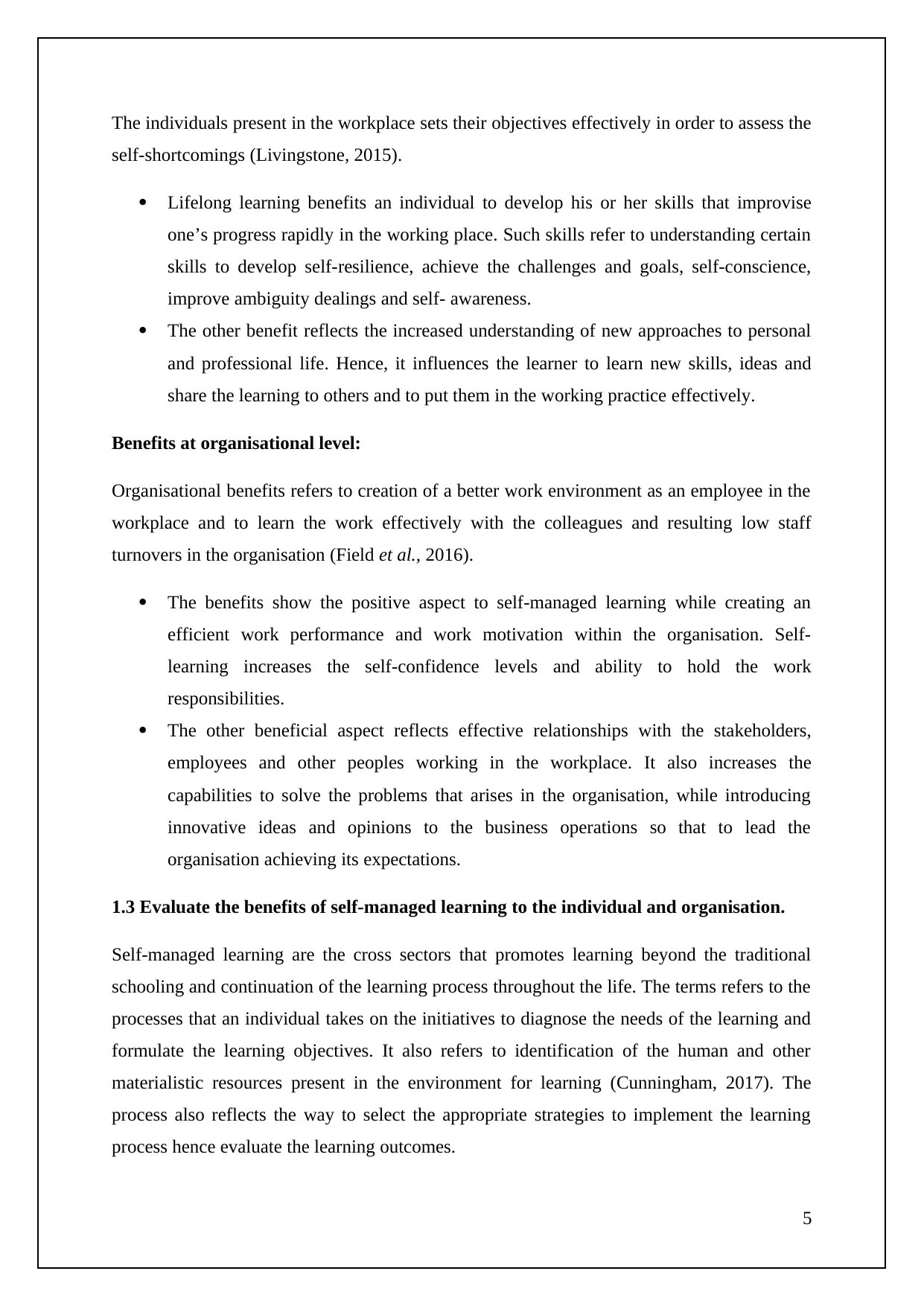
The individuals present in the workplace sets their objectives effectively in order to assess the
self-shortcomings (Livingstone, 2015).
Lifelong learning benefits an individual to develop his or her skills that improvise
one’s progress rapidly in the working place. Such skills refer to understanding certain
skills to develop self-resilience, achieve the challenges and goals, self-conscience,
improve ambiguity dealings and self- awareness.
The other benefit reflects the increased understanding of new approaches to personal
and professional life. Hence, it influences the learner to learn new skills, ideas and
share the learning to others and to put them in the working practice effectively.
Benefits at organisational level:
Organisational benefits refers to creation of a better work environment as an employee in the
workplace and to learn the work effectively with the colleagues and resulting low staff
turnovers in the organisation (Field et al., 2016).
The benefits show the positive aspect to self-managed learning while creating an
efficient work performance and work motivation within the organisation. Self-
learning increases the self-confidence levels and ability to hold the work
responsibilities.
The other beneficial aspect reflects effective relationships with the stakeholders,
employees and other peoples working in the workplace. It also increases the
capabilities to solve the problems that arises in the organisation, while introducing
innovative ideas and opinions to the business operations so that to lead the
organisation achieving its expectations.
1.3 Evaluate the benefits of self-managed learning to the individual and organisation.
Self-managed learning are the cross sectors that promotes learning beyond the traditional
schooling and continuation of the learning process throughout the life. The terms refers to the
processes that an individual takes on the initiatives to diagnose the needs of the learning and
formulate the learning objectives. It also refers to identification of the human and other
materialistic resources present in the environment for learning (Cunningham, 2017). The
process also reflects the way to select the appropriate strategies to implement the learning
process hence evaluate the learning outcomes.
5
self-shortcomings (Livingstone, 2015).
Lifelong learning benefits an individual to develop his or her skills that improvise
one’s progress rapidly in the working place. Such skills refer to understanding certain
skills to develop self-resilience, achieve the challenges and goals, self-conscience,
improve ambiguity dealings and self- awareness.
The other benefit reflects the increased understanding of new approaches to personal
and professional life. Hence, it influences the learner to learn new skills, ideas and
share the learning to others and to put them in the working practice effectively.
Benefits at organisational level:
Organisational benefits refers to creation of a better work environment as an employee in the
workplace and to learn the work effectively with the colleagues and resulting low staff
turnovers in the organisation (Field et al., 2016).
The benefits show the positive aspect to self-managed learning while creating an
efficient work performance and work motivation within the organisation. Self-
learning increases the self-confidence levels and ability to hold the work
responsibilities.
The other beneficial aspect reflects effective relationships with the stakeholders,
employees and other peoples working in the workplace. It also increases the
capabilities to solve the problems that arises in the organisation, while introducing
innovative ideas and opinions to the business operations so that to lead the
organisation achieving its expectations.
1.3 Evaluate the benefits of self-managed learning to the individual and organisation.
Self-managed learning are the cross sectors that promotes learning beyond the traditional
schooling and continuation of the learning process throughout the life. The terms refers to the
processes that an individual takes on the initiatives to diagnose the needs of the learning and
formulate the learning objectives. It also refers to identification of the human and other
materialistic resources present in the environment for learning (Cunningham, 2017). The
process also reflects the way to select the appropriate strategies to implement the learning
process hence evaluate the learning outcomes.
5
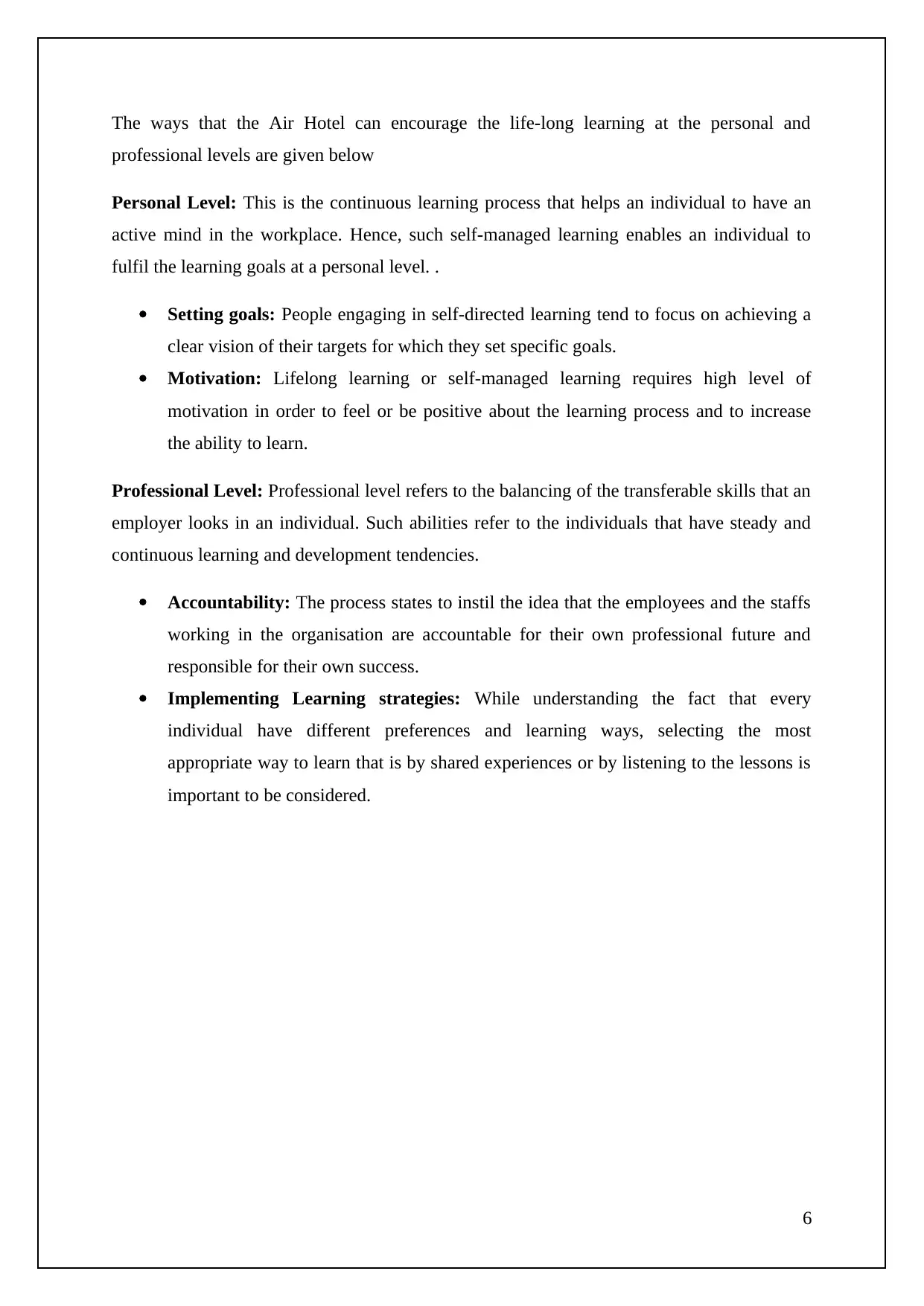
The ways that the Air Hotel can encourage the life-long learning at the personal and
professional levels are given below
Personal Level: This is the continuous learning process that helps an individual to have an
active mind in the workplace. Hence, such self-managed learning enables an individual to
fulfil the learning goals at a personal level. .
Setting goals: People engaging in self-directed learning tend to focus on achieving a
clear vision of their targets for which they set specific goals.
Motivation: Lifelong learning or self-managed learning requires high level of
motivation in order to feel or be positive about the learning process and to increase
the ability to learn.
Professional Level: Professional level refers to the balancing of the transferable skills that an
employer looks in an individual. Such abilities refer to the individuals that have steady and
continuous learning and development tendencies.
Accountability: The process states to instil the idea that the employees and the staffs
working in the organisation are accountable for their own professional future and
responsible for their own success.
Implementing Learning strategies: While understanding the fact that every
individual have different preferences and learning ways, selecting the most
appropriate way to learn that is by shared experiences or by listening to the lessons is
important to be considered.
6
professional levels are given below
Personal Level: This is the continuous learning process that helps an individual to have an
active mind in the workplace. Hence, such self-managed learning enables an individual to
fulfil the learning goals at a personal level. .
Setting goals: People engaging in self-directed learning tend to focus on achieving a
clear vision of their targets for which they set specific goals.
Motivation: Lifelong learning or self-managed learning requires high level of
motivation in order to feel or be positive about the learning process and to increase
the ability to learn.
Professional Level: Professional level refers to the balancing of the transferable skills that an
employer looks in an individual. Such abilities refer to the individuals that have steady and
continuous learning and development tendencies.
Accountability: The process states to instil the idea that the employees and the staffs
working in the organisation are accountable for their own professional future and
responsible for their own success.
Implementing Learning strategies: While understanding the fact that every
individual have different preferences and learning ways, selecting the most
appropriate way to learn that is by shared experiences or by listening to the lessons is
important to be considered.
6
⊘ This is a preview!⊘
Do you want full access?
Subscribe today to unlock all pages.

Trusted by 1+ million students worldwide
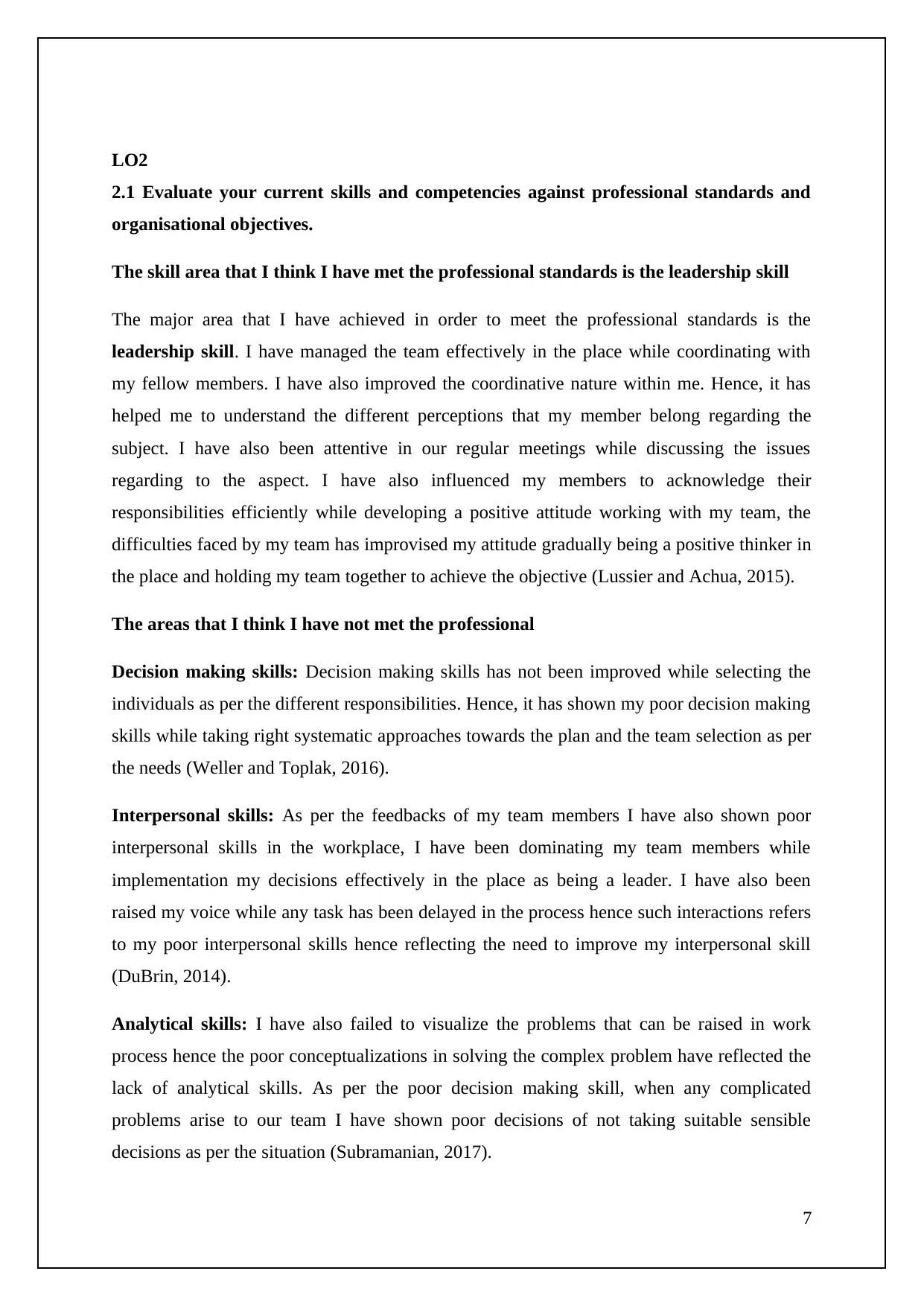
LO2
2.1 Evaluate your current skills and competencies against professional standards and
organisational objectives.
The skill area that I think I have met the professional standards is the leadership skill
The major area that I have achieved in order to meet the professional standards is the
leadership skill. I have managed the team effectively in the place while coordinating with
my fellow members. I have also improved the coordinative nature within me. Hence, it has
helped me to understand the different perceptions that my member belong regarding the
subject. I have also been attentive in our regular meetings while discussing the issues
regarding to the aspect. I have also influenced my members to acknowledge their
responsibilities efficiently while developing a positive attitude working with my team, the
difficulties faced by my team has improvised my attitude gradually being a positive thinker in
the place and holding my team together to achieve the objective (Lussier and Achua, 2015).
The areas that I think I have not met the professional
Decision making skills: Decision making skills has not been improved while selecting the
individuals as per the different responsibilities. Hence, it has shown my poor decision making
skills while taking right systematic approaches towards the plan and the team selection as per
the needs (Weller and Toplak, 2016).
Interpersonal skills: As per the feedbacks of my team members I have also shown poor
interpersonal skills in the workplace, I have been dominating my team members while
implementation my decisions effectively in the place as being a leader. I have also been
raised my voice while any task has been delayed in the process hence such interactions refers
to my poor interpersonal skills hence reflecting the need to improve my interpersonal skill
(DuBrin, 2014).
Analytical skills: I have also failed to visualize the problems that can be raised in work
process hence the poor conceptualizations in solving the complex problem have reflected the
lack of analytical skills. As per the poor decision making skill, when any complicated
problems arise to our team I have shown poor decisions of not taking suitable sensible
decisions as per the situation (Subramanian, 2017).
7
2.1 Evaluate your current skills and competencies against professional standards and
organisational objectives.
The skill area that I think I have met the professional standards is the leadership skill
The major area that I have achieved in order to meet the professional standards is the
leadership skill. I have managed the team effectively in the place while coordinating with
my fellow members. I have also improved the coordinative nature within me. Hence, it has
helped me to understand the different perceptions that my member belong regarding the
subject. I have also been attentive in our regular meetings while discussing the issues
regarding to the aspect. I have also influenced my members to acknowledge their
responsibilities efficiently while developing a positive attitude working with my team, the
difficulties faced by my team has improvised my attitude gradually being a positive thinker in
the place and holding my team together to achieve the objective (Lussier and Achua, 2015).
The areas that I think I have not met the professional
Decision making skills: Decision making skills has not been improved while selecting the
individuals as per the different responsibilities. Hence, it has shown my poor decision making
skills while taking right systematic approaches towards the plan and the team selection as per
the needs (Weller and Toplak, 2016).
Interpersonal skills: As per the feedbacks of my team members I have also shown poor
interpersonal skills in the workplace, I have been dominating my team members while
implementation my decisions effectively in the place as being a leader. I have also been
raised my voice while any task has been delayed in the process hence such interactions refers
to my poor interpersonal skills hence reflecting the need to improve my interpersonal skill
(DuBrin, 2014).
Analytical skills: I have also failed to visualize the problems that can be raised in work
process hence the poor conceptualizations in solving the complex problem have reflected the
lack of analytical skills. As per the poor decision making skill, when any complicated
problems arise to our team I have shown poor decisions of not taking suitable sensible
decisions as per the situation (Subramanian, 2017).
7
Paraphrase This Document
Need a fresh take? Get an instant paraphrase of this document with our AI Paraphraser

8
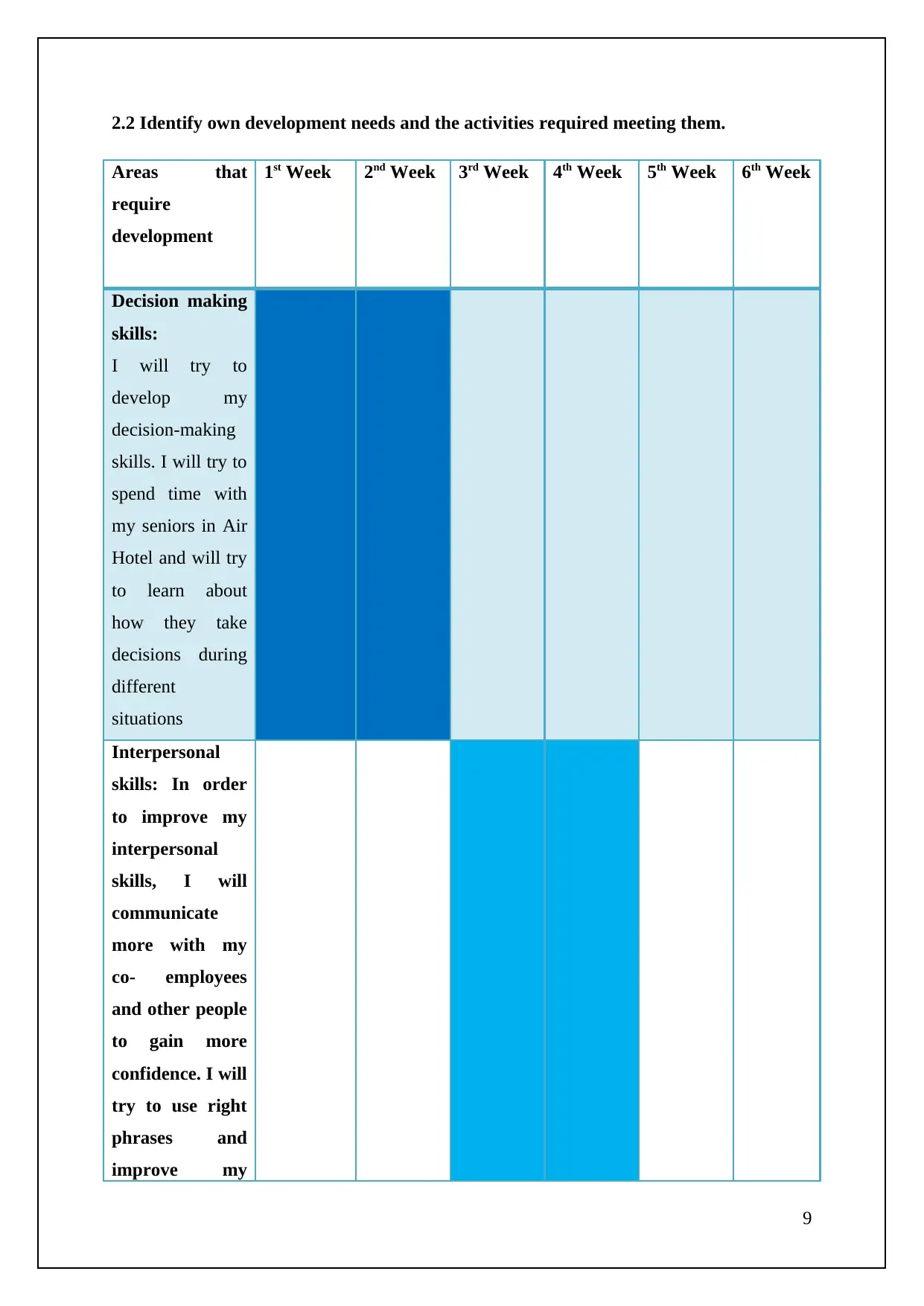
2.2 Identify own development needs and the activities required meeting them.
Areas that
require
development
1st Week 2nd Week 3rd Week 4th Week 5th Week 6th Week
Decision making
skills:
I will try to
develop my
decision-making
skills. I will try to
spend time with
my seniors in Air
Hotel and will try
to learn about
how they take
decisions during
different
situations
Interpersonal
skills: In order
to improve my
interpersonal
skills, I will
communicate
more with my
co- employees
and other people
to gain more
confidence. I will
try to use right
phrases and
improve my
9
Areas that
require
development
1st Week 2nd Week 3rd Week 4th Week 5th Week 6th Week
Decision making
skills:
I will try to
develop my
decision-making
skills. I will try to
spend time with
my seniors in Air
Hotel and will try
to learn about
how they take
decisions during
different
situations
Interpersonal
skills: In order
to improve my
interpersonal
skills, I will
communicate
more with my
co- employees
and other people
to gain more
confidence. I will
try to use right
phrases and
improve my
9
⊘ This is a preview!⊘
Do you want full access?
Subscribe today to unlock all pages.

Trusted by 1+ million students worldwide
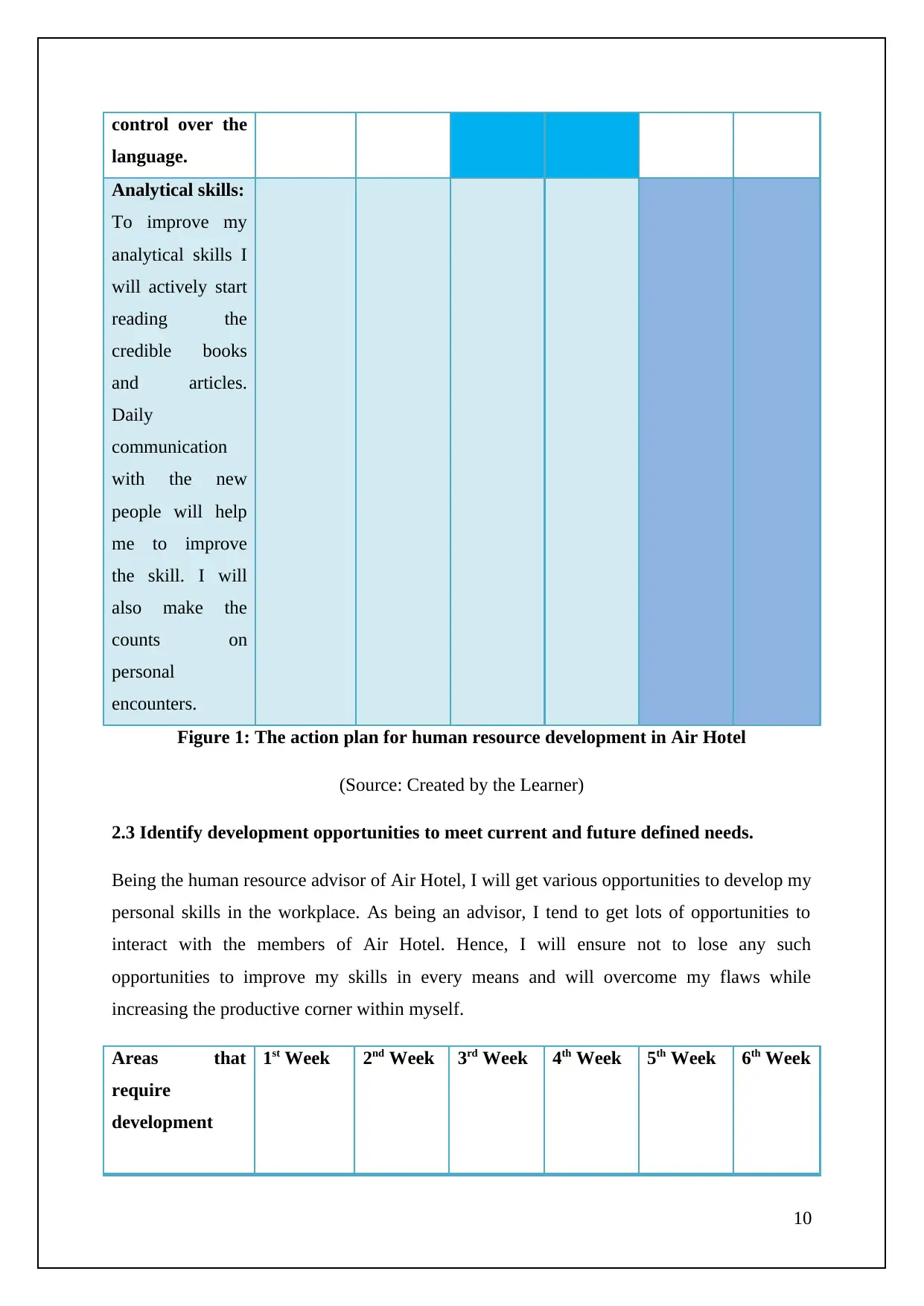
control over the
language.
Analytical skills:
To improve my
analytical skills I
will actively start
reading the
credible books
and articles.
Daily
communication
with the new
people will help
me to improve
the skill. I will
also make the
counts on
personal
encounters.
Figure 1: The action plan for human resource development in Air Hotel
(Source: Created by the Learner)
2.3 Identify development opportunities to meet current and future defined needs.
Being the human resource advisor of Air Hotel, I will get various opportunities to develop my
personal skills in the workplace. As being an advisor, I tend to get lots of opportunities to
interact with the members of Air Hotel. Hence, I will ensure not to lose any such
opportunities to improve my skills in every means and will overcome my flaws while
increasing the productive corner within myself.
Areas that
require
development
1st Week 2nd Week 3rd Week 4th Week 5th Week 6th Week
10
language.
Analytical skills:
To improve my
analytical skills I
will actively start
reading the
credible books
and articles.
Daily
communication
with the new
people will help
me to improve
the skill. I will
also make the
counts on
personal
encounters.
Figure 1: The action plan for human resource development in Air Hotel
(Source: Created by the Learner)
2.3 Identify development opportunities to meet current and future defined needs.
Being the human resource advisor of Air Hotel, I will get various opportunities to develop my
personal skills in the workplace. As being an advisor, I tend to get lots of opportunities to
interact with the members of Air Hotel. Hence, I will ensure not to lose any such
opportunities to improve my skills in every means and will overcome my flaws while
increasing the productive corner within myself.
Areas that
require
development
1st Week 2nd Week 3rd Week 4th Week 5th Week 6th Week
10
Paraphrase This Document
Need a fresh take? Get an instant paraphrase of this document with our AI Paraphraser
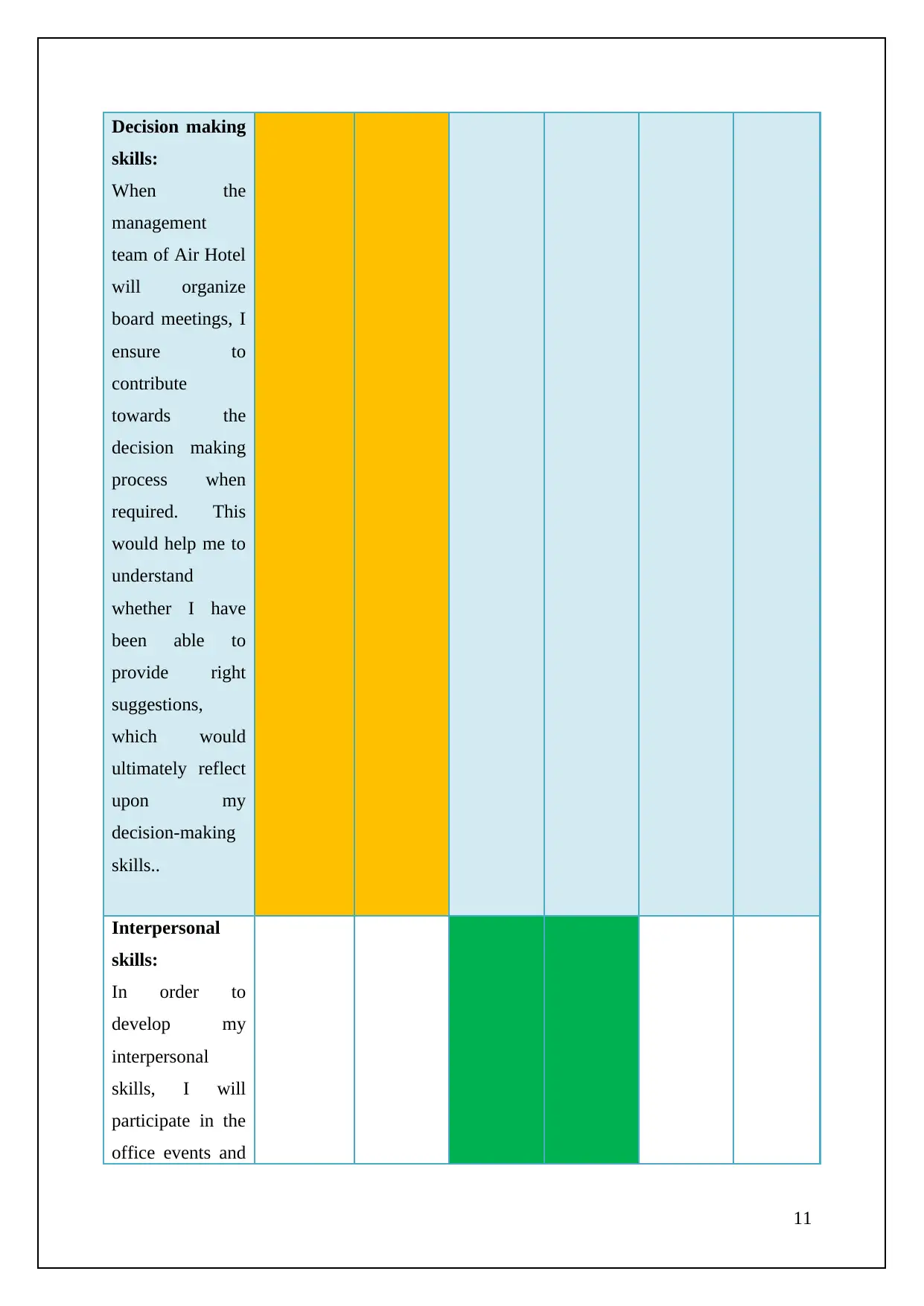
Decision making
skills:
When the
management
team of Air Hotel
will organize
board meetings, I
ensure to
contribute
towards the
decision making
process when
required. This
would help me to
understand
whether I have
been able to
provide right
suggestions,
which would
ultimately reflect
upon my
decision-making
skills..
Interpersonal
skills:
In order to
develop my
interpersonal
skills, I will
participate in the
office events and
11
skills:
When the
management
team of Air Hotel
will organize
board meetings, I
ensure to
contribute
towards the
decision making
process when
required. This
would help me to
understand
whether I have
been able to
provide right
suggestions,
which would
ultimately reflect
upon my
decision-making
skills..
Interpersonal
skills:
In order to
develop my
interpersonal
skills, I will
participate in the
office events and
11
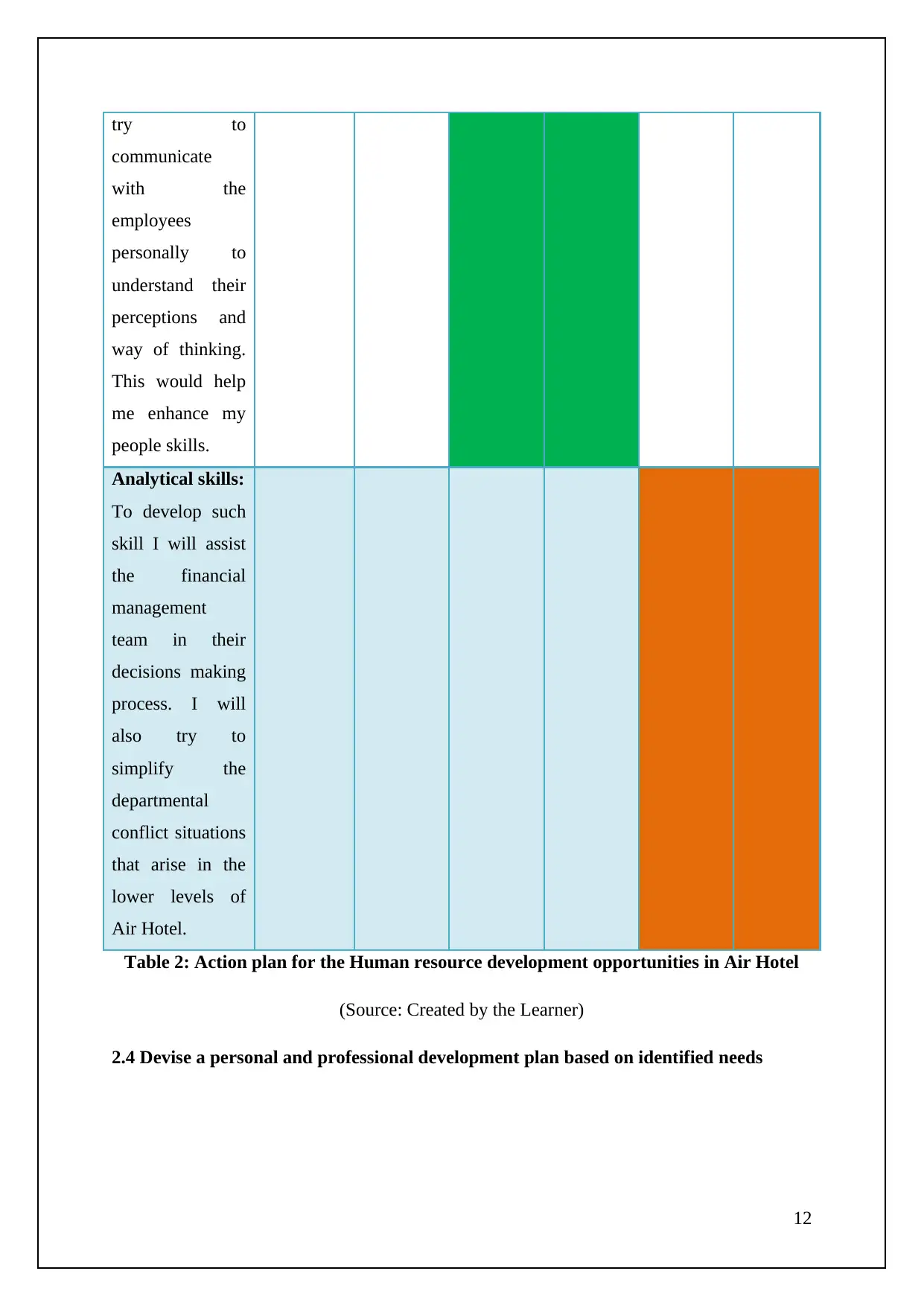
try to
communicate
with the
employees
personally to
understand their
perceptions and
way of thinking.
This would help
me enhance my
people skills.
Analytical skills:
To develop such
skill I will assist
the financial
management
team in their
decisions making
process. I will
also try to
simplify the
departmental
conflict situations
that arise in the
lower levels of
Air Hotel.
Table 2: Action plan for the Human resource development opportunities in Air Hotel
(Source: Created by the Learner)
2.4 Devise a personal and professional development plan based on identified needs
12
communicate
with the
employees
personally to
understand their
perceptions and
way of thinking.
This would help
me enhance my
people skills.
Analytical skills:
To develop such
skill I will assist
the financial
management
team in their
decisions making
process. I will
also try to
simplify the
departmental
conflict situations
that arise in the
lower levels of
Air Hotel.
Table 2: Action plan for the Human resource development opportunities in Air Hotel
(Source: Created by the Learner)
2.4 Devise a personal and professional development plan based on identified needs
12
⊘ This is a preview!⊘
Do you want full access?
Subscribe today to unlock all pages.

Trusted by 1+ million students worldwide
1 out of 27
Related Documents
Your All-in-One AI-Powered Toolkit for Academic Success.
+13062052269
info@desklib.com
Available 24*7 on WhatsApp / Email
![[object Object]](/_next/static/media/star-bottom.7253800d.svg)
Unlock your academic potential
Copyright © 2020–2026 A2Z Services. All Rights Reserved. Developed and managed by ZUCOL.





